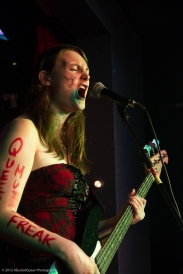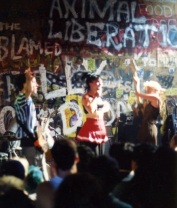I’m in a band called Not Right. We’ve been “together” for a little over a year now. I often describe the music we play as “riot grrrl”, because I feel inspired by the ideals and music associated with the term. My bandmates have a somewhat different relationship with “riot grrrl” to me; we’re all pretty cool with this multiplicity of positions.
Bikini Kill’s “Rebel Girl” was the very first song we learned together. At the time, this seemed like a pretty straightforward decision, as it’s a really “easy” piece. But the more I think about it, the more I feel that it’s very interesting that we play this song.
Why riot grrrl?
There’s a fair amount of talk about the idea of a riot grrrl revival floating around the Internet, with an apparent increase in interest from 2010 or so. At the same time, there are words of caution from those involved in the original riot grrrl movement: a recent example can be found in this interview with Kathleen Hanna, published just last week.
She says:
Everyone is always asking me, “How do we restart riot grrrl?” And I’m like, “Don’t.” Because something’s organically going to happen on its own; you can’t force it. Who wants to restart something that’s 20 years old? Start your own fucking thing.
A more nuanced analysis can be found in a blog post from 2010 at Side Ponytail:
I feel like there’s been a lot of talk about how “original” riot grrrls are protective of/territorial about the riot grrrl movement. That they are, perhaps, trying to keep all of the riot grrrl for themselves. I don’t think that is true AT ALL. In fact, I think that they are working to encourage parties who are interested in riot grrrl by telling them, “You are already valuable and should be doing your own thing,” and I don’t think that there’s anything wrong with that message. I think they’re also working to make people who weren’t a part of the original riot grrrl scene more cognizant of some of riot grrrl’s troubled history in the hopes of preventing a scene that blindly and unintentionally reproduces those same failings. While many people speaking out in the interests of having a riot grrrl revival have indicated that they are aware of these issues, there seems to be a general consensus that “we’re all more educated now and these things won’t be problems anymore,” which is an approach that really worries me.
[…]
I’m also a little bit troubled by the general attachment to the riot grrrl name. To me, at this point in time, such an attachment suggests more of a brand name identification than anything else. I can be a girl, play a guitar, make a zine, write letters to friends, engage in community building, etc. all without calling myself a riot grrrl. Naming something is a very loaded act and I wonder, if we’re all so aware of riot grrrl’s problematic history and the bad baggage that the riot grrrl name often carries for working class girls, pocs, and transfolk, why we want to carry that name over into a movement that is supposedly more inclusive and aware.
Okay, so here’s the deal. I’m a white, middle-class trans woman in my mid-20s, writing in 2012. I never had the opportunity to get involved with riot grrrl because I was way too young. But, in spite of its problematic elements (including cissexism and transphobia) I still find the history of riot grrrl, the music, the language, the very sense of challenge inherent in the term itself, deeply inspirational.
I look beyond riot grrrl. For years I’ve been inspired by contemporary female-fronted heavy metal bands such as The Gathering and Within Temptation. I’m also into acts who pre-date riot grrrl, like Joan Jett and Girlschool. But in riot grrrl I find that perfect meeting of punk spirit and feminist politic in the context of furious riffs and brilliantly ragged vocals.
Riot grrrl is fascinating because it was, in a sense, a small local scene that hit well above its weight in terms of international influence. Feminist musicians all around the world remain inspired by it. And in light of this, I do think that it’s possible, and positive, to “revive” riot grrrl: in fact, the revival is well underway, and we are doing it differently.
Riot grrrl in 2012 remains feminist, DIY, largely (but not entirely!) punk. But it’s now international, facilitating conversations between female musicians around the world: a great example of this can be found in the free compilations released by the Riot Grrrl Berlin collective. The political focus has shifted towards an intersectional feminism that takes account of diversity along axes such as race, dis/ability, gender identity and sexuality. We are doing our own thing, but we want to call it “riot grrrl” because of the inspiration we take from the music of a particular time and place.
I’d like to think that most of us are aware of the imperfections as well. We know that riot grrrl didn’t get it right. We know that we’re not going to get it right. Being aware of these limitations is the only way we stand a chance of gradually becoming more awesome over time.
Why Rebel Girl?
As a trans woman, I’m also very aware that both the original riot grrrl movement and many of the original riot grrrls weren’t particularly trans-friendly. Bikini Kill lead singer Kathleen Hanna hasn’t exactly got the greatest record on this front either. So why do I want to sing her song?
For me, “Rebel Girl” is punk as fuck: it’s ridiculously catchy and very powerful (both musically and lyrically) because of its simplicity. It’s accessible for both listeners and musicians (including those musicians who are literally just starting out, as I was last year). If you play it with passion, it can sound fantastic even if you’re technically not particularly great as a singer or on your instrument.
That girl thinks she’s the queen of the neighbourhood
She rides the hottest trike in town
That girl she holds her head up so high
I think I wanna be her best friend yeah
As a woman, I feel that I have the right to claim this song; I have always been inspired by the strength and achievements of my feminist sisters. As a trans woman, I feel that it’s productive to claim art with a problematic history and make it my own.
Rebel girl, rebel girl
Rebel girl you are the queen of my world
“Rebel Girl” becomes about my own relationship with riot grrrl: I celebrate how the song has inspired me. Even better, there’s some pretty blatant subtext acquired by the lyrics when sung by a trans person.
Rebel girl, rebel girl
I think I wanna take you home I wanna try on your clothes oh
I further identify with the song as a bisexual woman, and as an activist. When Not Right play “Rebel Girl”, I feel a connection between queer past and queer future.
When she talks, I hear the revolution
In her hips, there’s revolutions
When she walks, the revolution’s coming
In her kiss, I taste the revolution
There’s more than one studio version of “Rebel Girl”. The differences lie mostly in the recording quality and performance style, but there’s also variation within the lyrics of the third verse. One version labels the titular girl a “slut”, another calls her a “dyke”. At queer events, I’m more likely to sing the latter line. In the light of contemporary political commentary over slut-shaming, I also like to sing the former. This ambiguity fits well with the song’s popularity as a cover: there is no absolute, authoritative version. And that’s as it should be.
That girl thinks she’s the queen of the neighborhood
I got news for you, she is!
They say she’s a slut, but I know
She is my best friend, yeah
I believe that any girl can be a riot grrrl. When I sing “Rebel Girl”, I reclaim a version of riot grrrl for here and now, and for some of those who were marginalised the first time around. Maybe you can find a similar power in such songs?




